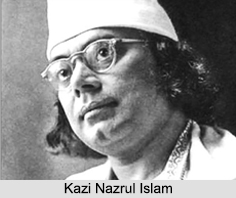 Hindu-Muslim War is a poem which was written by the famous revolutionary poet Kazi Nazrul Islam. In Bengali the poem is called "Hindu-Muslim Juddho".
Hindu-Muslim War is a poem which was written by the famous revolutionary poet Kazi Nazrul Islam. In Bengali the poem is called "Hindu-Muslim Juddho".
"Hindu-Muslim War" Translated in English
Take heart! Take heart! Meseems
India has come alive at long last.
The cremation ground and the burial yard
have sprung today to life.
Those who were condemned to eternal death
have been shocked by pain into awakening,
Khaled wields his sword again,
And Arjuna strings his bow.
India has woken up: Hindus and Muslims
have taken up the cudgels in their hands.
Hindus die, Muslims die from each other`s blows-
It is the living that are dying:
such death carries no shame!
They fight because their strength has surged,
and they know each other anew through clash of arms
The test today is: whose the stronger fist?
Who would die in tomorrow`s head-on clash
and who aren`t willing to die?
Come and listen to the clamour of life
from the throats of half-alive men-
Nectar will come up soon, for poison is already up!
Cease not-go on with churning!
Kaffirs are up, so are yavanas.
Now shall arise the real Hindus and Muslims
of great might.
You have awakened, God too has,
His machine has started working.
It seems today the master and the pupil
are engaged in a trial of strength.
Time is dealing blow after blow to make
timorous India fearless.
Time is watching if the wrist or the clenched fist
gives way at the softest blow,
and watching, too, who makes the grade
by striking hard and wins the fight,
and which general keeps his head cool in this mock
warfare.
Who is this so-called hero
who at sight of a few drops of blood
is burrowing under the quilt and patchwork rug
putting away his sword, has besmeared himself with ink
and is mouthing delirious nonsense!
Goodness, would these poltroons
lead the re volution-to-come!
What could they do when storm and cyclone break,
they whose brains reel at a mere whiff of squall?
Providence is testing
who can swim across the sea of blood.
Your own blows have razed
your temples and mosques
whose foundations were laid
by the tainted hands of a subject people.
It seems God himself is effacing
the prayer-houses of those who are others` slaves!
Martyrs will raise the altar
with earth consecrated by bond-free hands.
Have the spires fallen?
Well, so has your slumber collapsed with them.
Who kills whom?-The puzzle is not yet solved,
the darkness not yet gone,
they know not that in the darkness
they mistake their own for enemies and hit them!
The sun will rise, the confusion will dissolve,
vision will clear, barriers will be down,
and they will see that they have killed
their brothers behind barred doors!
The trident and the sword
have cut and slashed the destiny of India!
The cudgel that has today broken the mosques
and brought down the temple spires
will tomorrow reduce the enemy fortress to shambles!
That morning brothers will not fight one another,
They will know their enemies from their own folk.
Let them quarrel: they have at least awakened
-Fly the flag of victory!
If your tail has been set on fire
Burn with it the golden city of Lanka!













